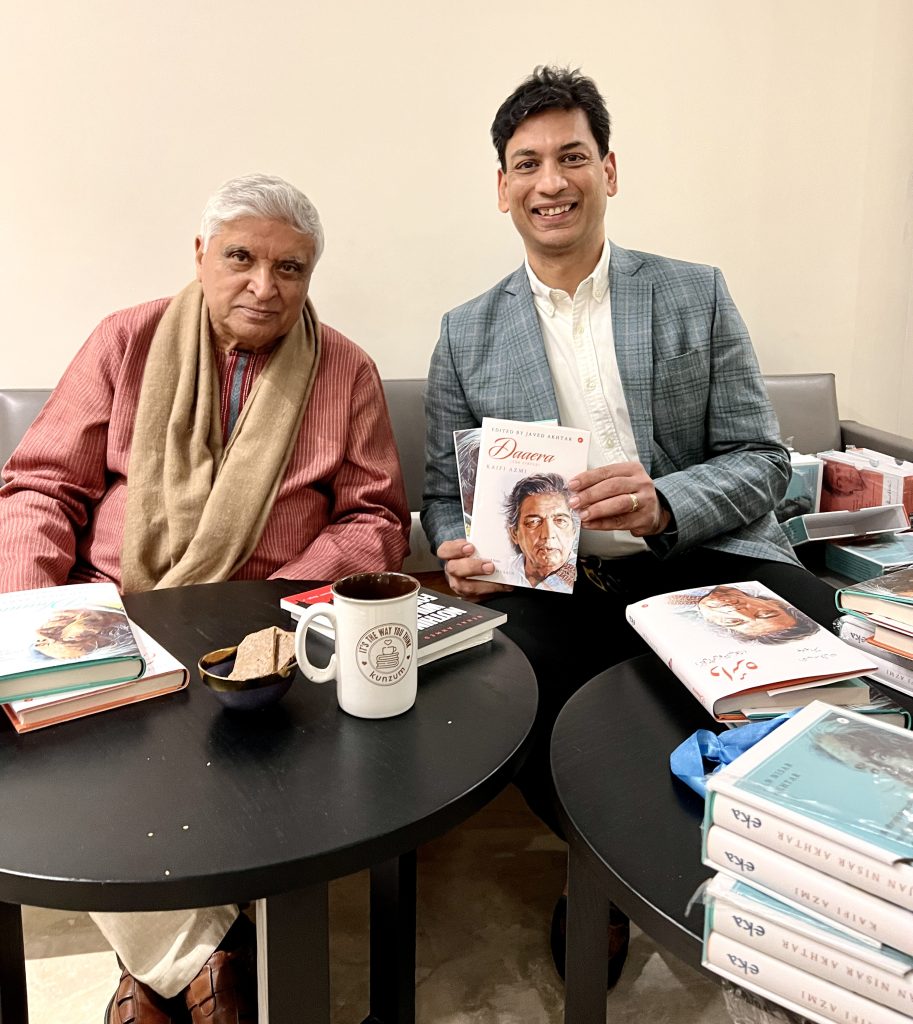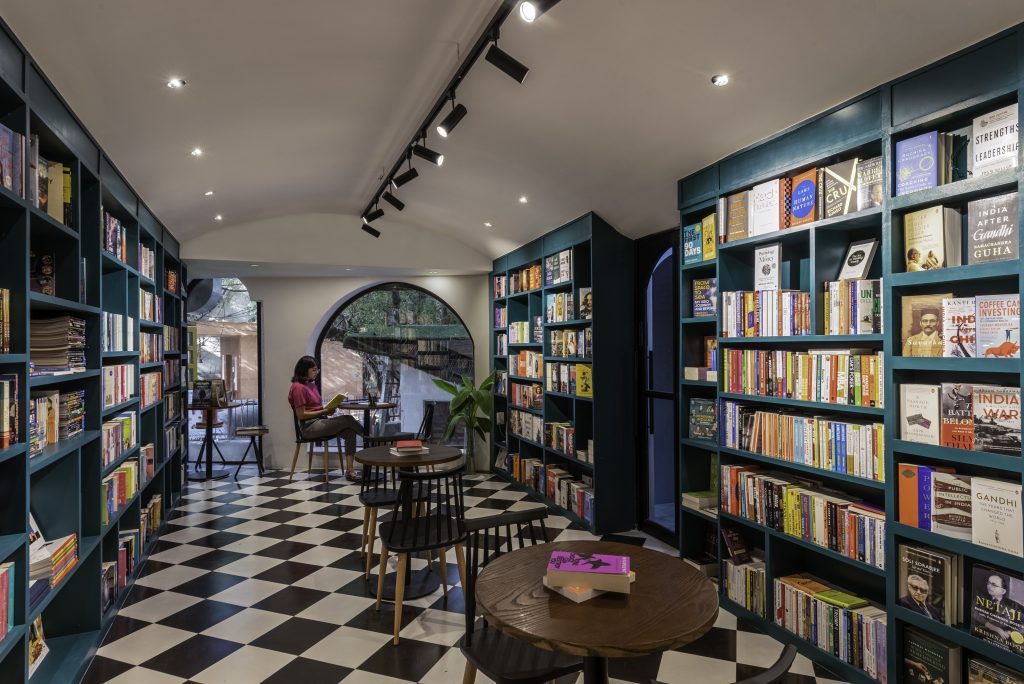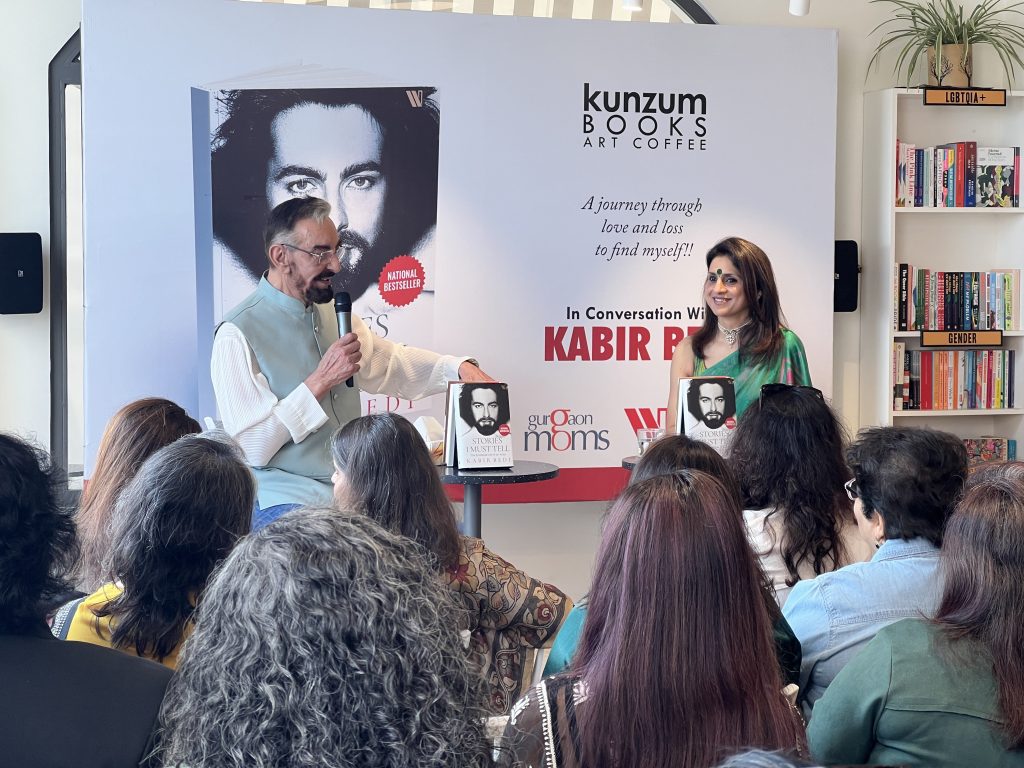During a book launch a few months ago, Ajay Jain ran into a senior citizen who loves books but could no longer read due to eyesight issues. His bookstore also had a college student visiting who loved reading but could not afford to buy them. “The two got talking. Before the evening was out, the former purchased a book for her newly-acquainted reader, ensuring that someone would go to sleep reading a book,” Ajay tells Global Indian. The 54-year-old is an author, photographer, traveler, and founder of Kunzum, a chain of boutique bookstores.
An engineer and a management student who graduated from Cardiff University, the entrepreneur set up his chain of bookstores in 2022 and currently operates six outlets in New Delhi. At a time when everyone bemoans the lack of physical bookstores, this enterprising reader has actually walked the talk, creating an atmosphere of reading and a space where people can meet, engage, and build relationships.

Ajay Jain with Javed Akhtar
The wealth of words
An avid reader since childhood, Ajay took to writing books in 2007 (he has eleven published works so far), and while his initial focus was on travel, he expanded his oeuvre to write on personal development, marketing, and fiction too. And this is how Kunzum was born. He shares, “It was the name of my travel blog (Kunzum is a high altitude pass in the Indian Himalayas) and publishing imprint. I set up the Kunzum Travel Café in 2010 to serve as a gallery for my photography and books. We built a community there around events and coffee.”
It was in the aftermath of the pandemic that Kunzum Travel Café was rebranded as Kunzum Books. When the pandemic forced a shutdown, the entrepreneur took it as an opportunity to reflect and recalibrate the bookstore.
Building a community
Since Ajay has been focused on writing books, he understands their importance to society and adds, “I have been disappointed at the dearth of bookshops in India. Especially the ones that make browsing a pleasing experience. And it also made things difficult for authors—how do they promote their books if distribution is scarce? Online platforms like Amazon have their value, but most authors need to face their customers to be able to make an impression.”
Thus, he took the decision to invest in bookshops, despite the uncertainty of the pandemic still hanging heavy. The entrepreneur realized that retail had to focus on one differentiator: experience. He went about building that with a community of authors, readers, editors, designers, and publishers who can come together for the love of books. And with the help of curated lists, book clubs, events, and activities, he created a cerebral space for bookworms.
Breaking barriers in more ways than one, Kunzum Travel Café followed the ‘pay-what-you-like’ model; the idea was to eliminate any entry and exit barriers to the place and give a sense of ownership to guests.

Kunzum, Delhi
At Kunzum Books, Ajay tweaked the model a bit: coffee and tea, along with their secret brownie cookies, are complimentary, but only if people buy a book. He smiles and says, “We still do not sell the coffee. If you want a cuppa at Kunzum, you have to buy a book. It’s become a talking point and another idea that is shaping the culture called Kunzum.”
Going against the tide
While bookstores are closing in India, one wonders what pushed Ajay to start not one but six stores! “Because someone had to,” he deadpans and answers, “not as charity, but as a venture for profit. So it sustains. A good and useful idea cannot be allowed to fail. But it’s a business with a cause. Bookstores are repositories of our culture, our values, our ideas, our stories, and our literature. They shape the character of who we are as individuals and as a society.”
The road to success is challenging, especially in the business of bookstores. Ajay nods and adds, “People. That is the single biggest challenge for any business, but more so for small and medium enterprises. Since capital is always limited, one cannot burn cash, and finding the right personnel is also not easy.”
One of the biggest problems with physical bookstores is the heavy discounting online players offer. Physical bookstores cannot compete with price cuts on Amazon, the only book e-commerce player of note. The entrepreneur is cognizant of this discrepancy and adds, “Publishers can plug this—they can impress upon Amazon to eliminate discounts and hold back supplies to offending vendors on the site. If they have the will, they can do it. With a level playing field, customers would any day prefer to pick up their books from a physical store.”
Facing all of these challenges is not easy. But Ajay is not one to give up easily. Kunzum bookstores are a haven for those who want a respite from the endless materialism of modern-day life. Their pre-loved book selection, the lovingly curated store, and the passion of the founder make it a cozy and welcoming space.
Ajay recounts a meeting with an elderly woman who visited the store with her daughter and two granddaughters. “Even at 90, she cannot sleep unless there are at least 3–4 books on her bed,” Ajay smiles. Experiences like these motivate the founder to put more energy into his belief that bookshops are vital to shaping the culture and character of societies and individuals. He adds, “This belief has driven us to invest in such community spaces and thus do our bit to make ours a better world to live in.”
The next evolution for Kunzum is to be a community of communities. They are seeding chapters of the Kunzum Book Club in schools, corporates, residential neighborhoods, and any other groupings of like-minded people.

Kabir Bedi at Kunzum
Ajay signs off, saying, “We will engage people in book discussions, author interactions, competitions, workshops, and more. As more people come into the fold, we will expand the culture of reading, leading to individual and societal development.”



